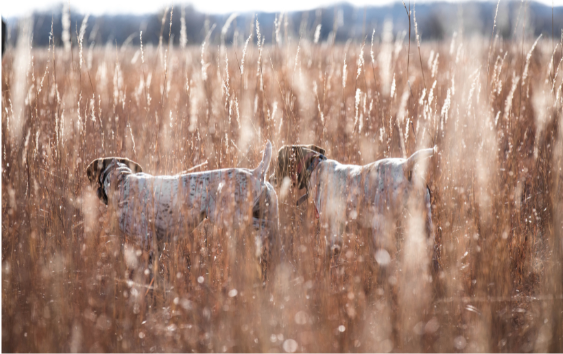Summer Swim Training for Duck-Hunting Dogs

Dove season is the perfect opportunity for you and your dog to shake off the summer lull. It offers real-time small game hunting dog training so you can tune your dog’s instincts and build a strong foundation for the hunts ahead. Here’s how to get field-ready.
Understanding Your Dog’s Instincts
Not every dog is cut out to hunt small game, but no matter which breed you favor, knowing your dog’s natural instincts helps them do their job better.
These three popular breeds excel at small game hunting for different reasons:
- Beagles have unmatched scenting power, are highly persistent and their small size enables them to dive into underbrush with ease.
- Terriers are known for their intelligence, tenacity and ability to flush game.
- Spaniels are fast, eager retrievers, especially adept at finding downed birds that have dropped in brush.
Each one brings a unique set of strengths to the field, proving that the best hunting partner is one whose instincts match your hunting goals.
Start with the Basics
Small game hunting dog training starts with the basics of solid obedience. Your pup should be familiar and respond to the words such as “sit,” “heel,” and “come.” These commands are the foundation of safety and control in the field. Teach them in a calm environment and increase distractions as your dog gains confidence. Praise and patience go a long way toward building trust.
Scent Work Builds Focus
Your dog’s ability to scent is its superpower. Finetune it by introducing them to the scent of the game you’ll be hunting with feathers or pelts. Hide scented objects to find, and keep these sessions short, fun, and positive. Over time, challenge them with hidden scent trails or buried retrieves.
Reward your adventure buddy when they get challenges right, so they build a positive association with their game. These exercises sharpen their mind and prime them for the real thing.
Practice Makes Perfect
Begin with familiar objects, then move to small game dummies. Keep the rewards flowing. Eventually, practice in tall grass or thick cover so your dog learns to locate and return game in all types of conditions. The best small game hunting dog training mimics the hunt, so practice with real gear, decoys and use blinds. All of this helps your dog feel at home in the environment they’ll work in. When the season opens, it’s just another day doing what they love.
Prioritize Safety and Socialization
As you undertake small game hunting dog training, remember that these hunts can get busy and noisy. Teach your dog to be comfortable around other dogs, hunters, and fast-moving situations. Use proper gear like protective vests and always brush up on local laws and safety regulations. Training your four-legged friend to be a confident, well-socialized dog strengthens the bond between you. That connection is what keeps them steady, focused, and effective when the action starts.
Training Tune Ups for Dove Season
Dove hunting is fast-paced and often unpredictable. It demands quick marks, steady sits, soft mouths and reliable retrieves. Dove season is also the first step into fall. It’s a season where you and your dog can get into the rhythms of cooler early mornings, listening for wings and trusting your instincts.
- Reinforce steady sits by practicing with distractions so your dog learns to stay put through fast action.
- Work on marking multiples with quick bumper throws to build memory and sharpen their focus during flurries.
- Sharpen the delivery using small dummies and rewarding gentle, direct retrieves to hand.
Training for the small game season isn’t just a warm-up. It’s a reminder of a bond that makes this lifestyle so rewarding. Whether you’re working with a seasoned retriever or just getting started with your first pup, early-season preparation is a wonderful way to reconnect with the land, the hunt, and the partnership you’re building with your dog.
